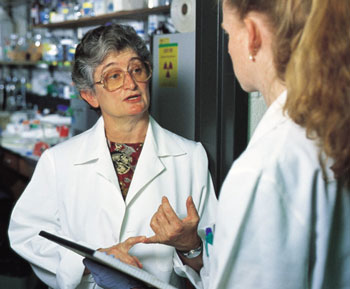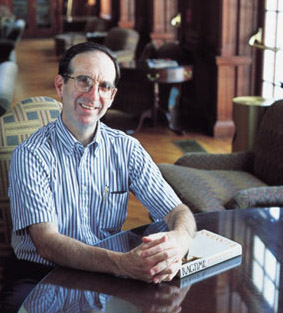

A publication of The Graduate School, University of North Carolina at Chapel Hill
Archives Fall 2000
Home | Back issues | About us | Email your feedback | The Graduate School | UNC-Chapel Hill | Make a gift
 |
| Photo by Will Owens |
| "When you are doing research and teaching, what some people may not realize is that you really carry the work with you all the time." |
Many
Hats
Graduate faculty fulfill a variety of roles
On an ordinary day at Carolina, the campus buzzes like a beehive. Thousands of people hurry from place to place. But a few of these people walk along Carolina’s red brick paths with a special sense of purpose. They, the professors, keep Carolina, and themselves, humming.
Faculty members typically work between 50 and 60 hours a week. On campus they teach classes, conduct research, hold office hours, meet with students, and participate in committee meetings. But most professors, like Professor of Pathology Marila Cordeiro-Stone, find that work never really ends. "When you are doing research and teaching," she says, "what some people may not realize is that you really carry the work with you all the time."
Professors use much of their time preparing for classes. Professor of Music Tom Warburton says, "I spend a large part of each day preparing lecture notes, which means that I have to review new research in the field continually." Many hours also go into grading papers and exams, and all professors hold office hours outside of class to meet with students individually. In addition, faculty members frequently create new classes that require them to explore new areas of research, which may take weeks to prepare.
The rest of a professor’s time usually goes into research. For a scientist, that means spending time in the lab. Dr. Cordeiro-Stone’s lab studies how human cells replicate their DNA and how particular enzymes repair damaged DNA. She has spent many years studying how human cells react to UV rays in sunlight and why radiation causes those cells to mutate. Her experiments could lead to significant advances in understanding the development of skin cancer.
Research for a humanities professor also requires hours of close concentration. Dr. Warburton explains that music research can take several different forms, including biographical studies of particular composers, studies of music in particular cultures, and the study of technical and theoretical aspects of music. "Much of my research," Dr. Warburton says, "has focused on twentieth-century music. I’ve written about a Native American opera and about the operas of Penderecki, and I’ve spent years studying ragtime and the American composer Charles Ives." Dr. Warburton frequently shares his time and expertise on ragtime with Carolina organizations such as the Chancellor’s Club.
 |
| Photo by Will Owens |
| "Graduate students are already members of the scholarly community. We just help them to develop their skills." |
Although their research interests appear to differ greatly, Dr. Cordeiro-Stone and Dr. Warburton share a commitment to graduate education and a philosophy toward mentoring graduate students. In the science laboratory, learning happens collaboratively, and Dr. Cordeiro-Stone feels a responsibility as the senior researcher to model good research practices for her students. She teaches them not only how to use advanced research techniques, but also when and under what circumstances particular techniques should be used. As Dr. Warburton says, "Graduate students are already members of the scholarly community. We just help them to develop their skills."
As former graduate students themselves, professors understand the demands on graduate students’ time. Dr. Cordeiro-Stone studied biology in her native Brazil and at the University of Texas at Austin, and returned home to finish her Ph.D. at the University of São Paulo. Dr. Warburton studied music at the University of Michigan where he and Carolina’s new Chancellor, James Moeser, were classmates and friends. Chancellor Moeser even played piano for Dr. Warburton’s wedding.
Like many senior faculty members, Dr. Warburton and Dr. Cordeiro-Stone have contributed some of their time to administrative duties in addition to their teaching and research. Dr. Warburton served as interim chair of the music department last year and this year has become assistant dean of the Honors Program. For ten years Dr. Cordeiro-Stone directed the graduate program in pathology, which has given her a particularly fascinating insight into the University’s graduate mission. She notes that graduate programs constantly strive to improve the quality of their curriculum and to attract the best students possible. "In the sciences," she says, "there is a great need for special funds for graduate education in terms of recruiting the best students here and funding them in their first years while they are still learning to conduct research."
In addition to extremely busy schedules on campus with teaching, research, and administration, professors also devote their time to their families and their communities. Dr. Warburton has been married for thirty-one years, raised two daughters, has been an organist for several churches, and has volunteered for numerous charities. Dr. Cordeiro-Stone also raised two daughters and has been active in the community.
With one of his own daughters in graduate school, Dr. Warburton often reflects on why he spends his time as he does. "The long hours are worth it because of the people here. I’ve always enjoyed interacting with and learning from a variety of people, and I can’t think of a better place to satisfy that interest than at Carolina."
- David A. Davis
© 2002, The Graduate School, The University of
North Carolina at Chapel Hill
All text and images are property of The Graduate School
at the University of North Carolina-Chapel Hill. Contact Sandra Hoeflich
at shoeflic@email.unc.edu
to request permission for reproduction.
Contact Alexandra Obregon at aobregon@email.unc.edu if you have technical problems with this Web site.